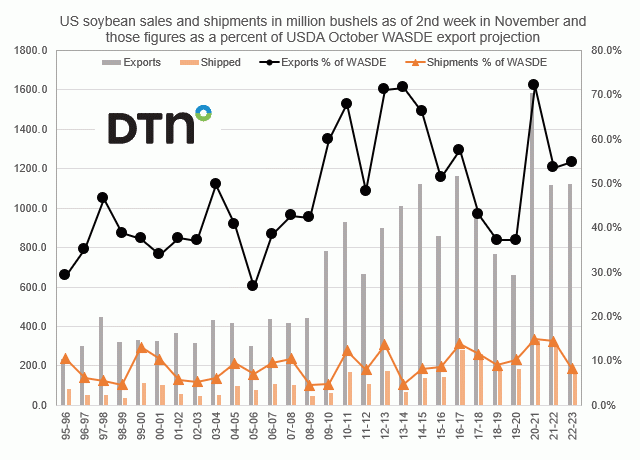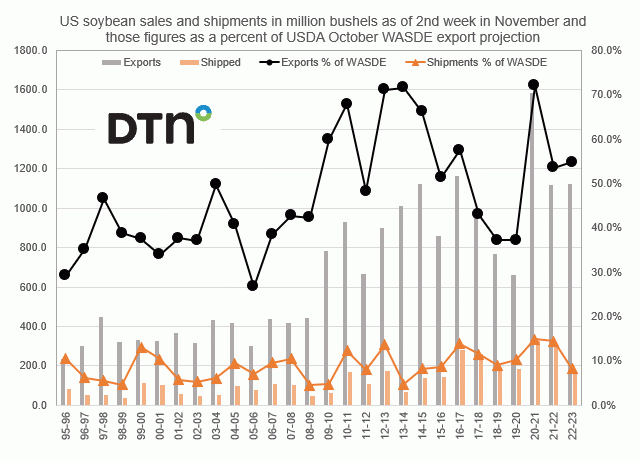Fundamentally Speaking
Early Season Soybean Sales Decent
In its October 2022 WASDE report, USDA lowered the 2022/23 U.S. soybean export projection by 40 million bushels (mb) to 2.045 billion bushels (bb) which would be the lowest total in three seasons and the third lowest total since the 2016/17 marketing year.
The reason cited is increased South American competition and in fact estimated exports from Argentina, Brazil, and Paraguay this year at 102.25 million metric tons (mmt) would be up 17.6 million tonnes, or 17% from the year ago figure.
Recently U.S. soybean sales have been very brisk reflected in a number of sales over the past two weeks to China and solid weekly export sales and inspection figures really since the marketing year began.
Nonetheless there are signs that sales will slow over the coming weeks for some of the very reasons we noted in a prior post where we talked about the sluggish early season pace of corn exports.
One can start with the high valued dollar based on an aggressive rate of monetary tightening by the Federal Reserve Board which stands in contrast to the more accommodative approach being taken by the central banks of Japan and China where policymakers there are more concerned about sluggish economic growth as opposed to wringing inflation out of the system.
P[L1] D[0x0] M[300x250] OOP[F] ADUNIT[] T[]
As a consequence, the greenback has moved to its highest levels vs. the Japanese yen in over 24 years and is the strongest vs. the Chinese yuan since 2008 making our sales effort to our largest soybean customer very difficult.
Already China has purchased a large number of soybeans from Argentina in the wake of increased farmers sales there and this is business that would have ordinarily gone to the U.S.
Now to that add water levels on the Mississippi River that have dropped to historic lows this fall halting barge shipments of grain and other commodities on the major shipping waterway.
This is of no small consideration given that 60% of U.S. grain exports exit the country via the Gulf Coast and this weighing on both our export sales and shipments and again business that we may not get back later in the marketing year.
Add to this a lot of skepticism about the last USDA WASDE projection of Chinese soybean imports this year at 98 million tonnes which is up quite a bit from last year's 90 million, despite the multitude of economic problems that country is having and fears of demand destruction in all commodities due to the persistence of historically high prices and contracting global GDP.
This graphic that shows U.S. soybean export sales and shipments as of the 2nd week in October in million bushels on the left-hand axis and as a percent of USDA October WASDE export projection on the right-hand axis.
This year's early season soybean sales pace is decent with 1.121 bb already sold which is just above the year ago 1.119 bb and the fourth highest ever for this time of year.
They represent 54.8% of the 2.045 bb October WASDE estimate which is right at the 10-year average of 54.4%.
Shipments however are lagging at a mere 168 mb, the lowest figure since the 2015/16 season for the second week in October and just 8.2% of the WASDE export projection which is the lowest percent since the 2013/14 season and below the ten-year average of 10.4%.
At some point, if this continues, there will be talk of sales this year not shipped for whatever reason and rolled into next year.
(c) Copyright 2022 DTN, LLC. All rights reserved.






Comments
To comment, please Log In or Join our Community .